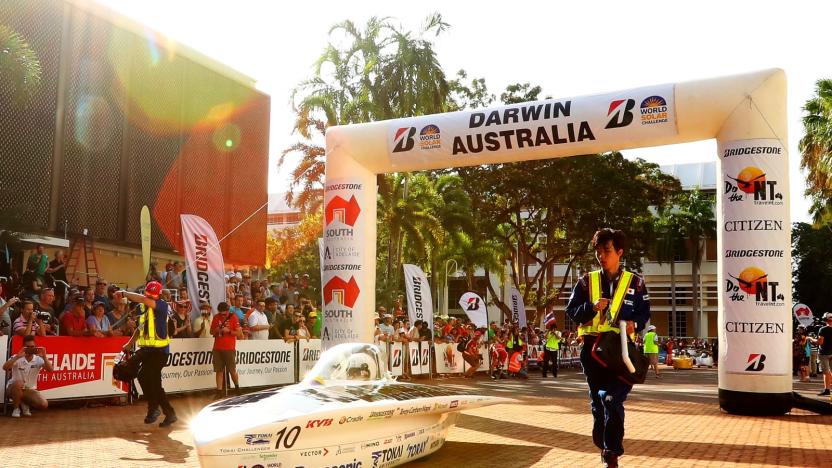WorldSolarChallenge
Latest

Solar car race kicks off 30th anniversary with a fresh challenge
It's a special moment in the history of clean energy: the 30th anniversary World Solar Challenge has begun. A total of 42 solar-powered cars (the largest field to date) left Darwin, Australia on October 8th to travel roughly 1,880 miles to Adelaide. The race officially lasts a week, but it's likely going to end considerably sooner for the front-runners -- the world record holders, Tokai University, took just under 30 hours in 2009. As it is, technical hiccups knocked out several competitors in the first day of racing.

Solar Team Eindhoven crafts solar-powered family car (video)
The solar-powered cars we've seen to date are usually built for just one person -- not very useful when many of us need to carry passengers. TU/e's Solar Team Eindhoven just brought some much-needed realism on that front by unveiling Stella, which it claims is the world's first solar-powered family car. The vehicle's combination of efficient solar cells with lightweight construction allows such radical concepts as back seats and a trunk while maintaining a 373-mile range. The barebones design won't rival most modern cars for luxury, but it's also energy-positive -- in typical use, it can contribute back to the power grid. You may even see it outside of competitions; while Stella is designed with October's World Solar Challenge in mind, Solar Team Eindhoven plans to make the car road-legal. Let's hope we catch it putting around Dutch streets. [Image credit: Bart van Overbeeke]

Inhabitat's Week in Green: solar train tunnels, refillable battery goop, and the world's first 3D-printed bikini
Each week our friends at Inhabitat recap the week's most interesting green developments and clean tech news for us -- it's the Week in Green. This week green transportation left fossil fuels in the dust as Inhabitat reported that a record-breaking electric VW Bug rocketed from 0-60 in 1.6 seconds and Team Steam unveiled a space age vehicle that is vying for the title of "fastest steam car on earth." We also spotted the world's first natural gas-powered supercar, while a team of Cambridge students unveiled a sleek solar racer that will attempt to travel 1,800 miles in the World Solar Challenge. Oil fuels also lost more luster as GM's CEO called for a $1 gas tax increase in the US, while MIT unveiled a new type of liquid flow battery that could refuel electric vehicles in a snap. As the summer sun hits its stride groundbreaking solar power projects are lighting up left and right - this week Google unveiled a new solar patent that could make solar energy cheaper than coal, while QSolar rolled out an array of rainbow-hued Kristal panels that can replace windows and walls. Photovoltaic gadgets also had their moment in the sun as Pixel Qi pulled back the curtain on a cheap, efficient solar-powered tablet and a wave and sun-powered seafaring robot received $22 million in funding. Speaking of solar power, this week we applauded the opening of a two-mile-long photovoltaic train tunnel that will provide power to the Paris-Amsterdam high-speed rail line. We were also wowed by Steve Jobs' vision for Apple's new spaceship-shaped clean energy campus, and our Bright Ideas Lighting Design Competition is really heating up, so be sure to vote for your favorite green lamp before the contest ends next week. Finally, we shared 6 great green Father's Day gifts for tech-savvy dads, and as summer gets set to begin we brought you exclusive photos of the recently opened section 2 of New York's High Line park, a beautiful suspended swimmer's oasis in Denmark, and the world's first 3D-printed bikini.

Japanese team takes top prize at World Solar Challenge
A Japanese team from Tokai University has taken the top spot at the World Solar Challenge, which was held at the end of last week in Australia. The team beat out the Delft University team which won four consecutive previous Challenges, and this year took second place, with the third seat going to the University of Michigan. The race course travels from southern to northern Australia over 3,000 km (about 1864 miles), and the winning team's car, Tokai Challenger, completed the race in just under 30 hours, averaging 62 miles per hour. Other notable participants included the MIT-built Eleanor. [Via Wired]
